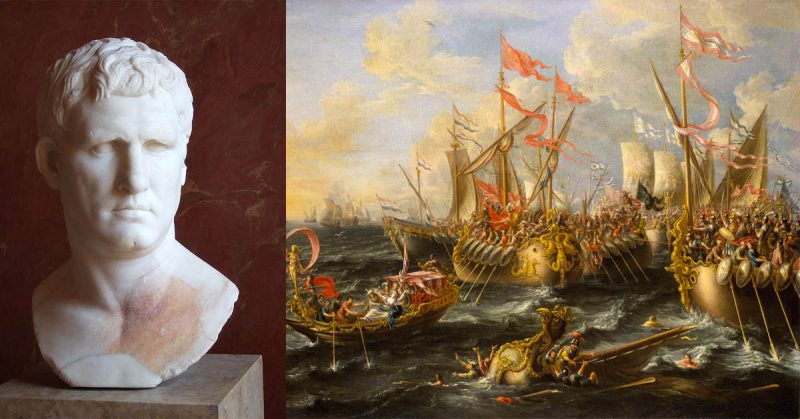Octavian Augustus was the first actual emperor of Rome; Caesar had held the dictatorship but was murdered a few years into his rule. Ambitious men in Rome were both loved and feared, as well as easily susceptible to being murdered through civil wars, assassinations or even angry mobs. Marcus Agrippa was a very intelligent man and an exceptional general who had no desire to be the first among Romans. Instead, he chose to support his childhood friend, Octavian, an equally, if not more, intelligent man, but a dreadful general.
Marcus Agrippa and Octavian grew up and learned together, despite Agrippa coming from a much poorer and lower status family. The two stayed good friends into adulthood throughout the civil wars of Caesar and Pompey, despite Agrippa’s brother siding with the Pompeian faction. Agrippa’s older brother was actually captured and subsequently pardoned when Octavian intervened to secure his safety.
Agrippa had combat experience as an officer under Caesar at the battle of Munda against members of the Pompeian faction when he was about 18 years old. He also served at the battle of Mutina when Antony was still at odds with the republic. That battle was a tactical stalemate, but the damages forced Antony to seek an alliance with Octavian rather than continue fighting.
Still a young man in his twenties, Agrippa fought as an officer under Octavian’s chosen general, Salvidienus Rufus. Though he seems to have been of similar age, Octavian trusted Salvidienus more as a general. He participated in the battle of Philippi that was largely commanded by Mark Antony with Octavian’s assistance.
Antony and Octavian had multiple feuds and one such feud was started by Antony’s relatives in Rome, Fulvia and Lucius Antonius. The two raised several legions, briefly controlled Rome, but were forced out and surrounded in the city of Perusia until starvation forced their surrender. it was a fairly minor war with the large exception that Octavian realized that his leading general, Salvidienus Rufus had sent word to Antony offering to defect to his side. This led to Salvidienus’ suicide or execution and control of Octavian’s forces fell, somewhat unofficially due to the still existing rule-laden republic, to Agrippa.
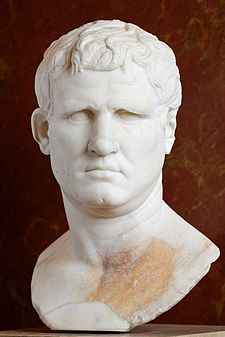
Agrippa spent a few years fighting against a barbarian uprising in Gaul and even ventured across the Rhine, only the second general to do so after Caesar, and fought very successfully against the Germanic tribes in 39-38 BCE. There are few details of these battles but the campaigns were successful enough for Agrippa to be granted a triumph. Octavian summoned Agrippa back to Italy to raise a fleet to combat Sextus Pompey who had controlled Sicily for some time and threatened Italy with his large and growing fleet. Agrippa actually refused his triumph on his return, saying that it would not be right while his friend Octavian was dealing with the crisis in Sicily.
Agrippa built a large fleet and ensured that the men were well trained before setting sail for Sicily. He was given reinforcements by the two other Triumvirs Antony and Lepidus, all now allies against Sextus. After a smaller battle near Mylae, Agrippa and Sextus met near Naulochus and fought a titanic battle, with over 500 total ships.
At Naulochus Agrippa had newer ships, but with well-trained crews and a new invention, the harpax. The harpax was essentially a ballista that shot a grappling hook. This hook hit an enemy ship and could then be winched together to be boarded. The grappling hook had a long iron shaft so that the enemy crews could not reach to cut the ropes. This invention allowed Agrippa’s ships to pick and choose their targets, ensuring favorable matchups for what was a massive group of singular ship-on-ship battles. Agrippa reportedly lost only three ships while capturing or destroying over two-thirds of Sextus’ force. The battle ended all Pompeian resistance and restored control of Sicily, a major source of grain for Italy.
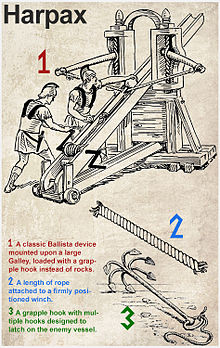
The peace between Antony and Octavian would soon erupt again in the absence of any other internal threats. Antony had control of the East, including Egypt and withholding grain, among other things, quickly led to renewed hostilities. Antony swiftly gathered an army and navy and occupied a fortified position on the northwestern coast of Greece. Knowing that Octavian would have to use vulnerable transports to cross the Adriatic and hoped to destroy them at sea. Agrippa had other plans.
Rather than attacking head on, Agrippa took a small but efficient naval force and went around Antony’s position and attacked the unfortified towns along Antony’s supply lines to Egypt. This distracted Antony enough that Octavian could land his army in Greece without worrying about his transports being attacked. Antony could do little as Agrippa tore up his supply lines, and finally, Antony’s strong defensive position turned to one of desperation and he needed to find a way to escape.
Antony had a strong position in his defended bay and hoped to bottleneck Agrippa’s and Octavian’s forces. Octavian, who actually had the final say wanted to attack, but Agrippa urged caution, knowing that they had the advantage and Antony desperately wanted to escape his bad position rather than fight a decisive action. Wisely, Octavian listened and Agrippa set the navy up in a crescent position blocking the exit from Antony’s bay.
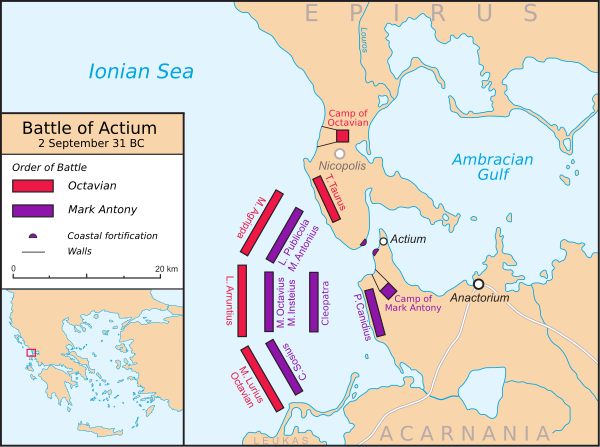
Antony’s forces attacked with undermanned ships as the men were weakened or killed by starvation and disease. Cleopatra’s naval group waited for their moment to escape and when a gap opened they left and didn’t look back. Once Antony saw Cleopatra clear the gap he soon followed. Agrippa had thought correctly and though Antony’s abandoned navy put up quite a fight, they were eventually dispatched by Agrippa’s well trained and disciplined forces. The battle removed the last great opposition to Octavian’s power over Rome.
With Antony finally beaten, later committing suicide, Octavian finally united Rome and all her holdings and eventually declared himself “first citizen” giving himself the name of Augustus and becoming Rome’s first emperor. Agrippa was loved by his army and had proven himself both a talented fighter and skilled general as opposed to Octavian who was a poor general and was often considered standoffish, being notably disliked by a great many people. Agrippa had a clear road to taking all of Octavian Augustus’ power but chose not to act on that. It was one of the wisest moves of his whole career, as only Octavian had proven to be politically suave enough to become the sole holder of power of a population who had a history of thoroughly despising kings, who knows what may have actually happened if Agrippa had tried to take that power for himself.
By supporting his friend, Agrippa secured his place as Augustus’ most trusted right-hand man. Sources describe Agrippa as being exiled at one point, but it seems to have been a planned political move to position Agrippa in the right area during a time of crisis. At one point Agrippa was given such titles to make him the heir apparent and the man chosen to lead if something were to happen to Augustus and eventually the powers granted to Agrippa made him almost an equal to Augustus.
Agrippa’s later life (and some of the years prior to the battle of Actium against Antony) was largely devoted to repairing and building up Rome. He oversaw mundane but vitally important work such as the cleaning and repairing of sewers and the construction of new aqueducts. He designed multiple new buildings including the lost temple that would be the inspiration for the later Pantheon built under Hadrian’s rule. He wrote extensively on geography and wrote an autobiography, but these are sadly lost.
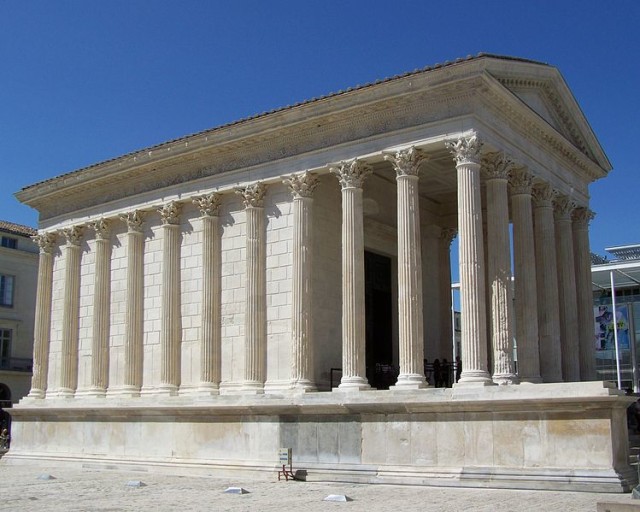
Agrippa helped Augustus to be able to say his famous words “I found Rome a city of bricks and left it one of marble”. Agrippa would return to the battlefield to secure Roman influence in Spain and the Crimean Peninsula and died at 51 in southern Italy. Augustus would mourn his friend’s death for over a month, and would later personally see to the education of Agrippa’s children.
By William McLaughlin for War History Online
